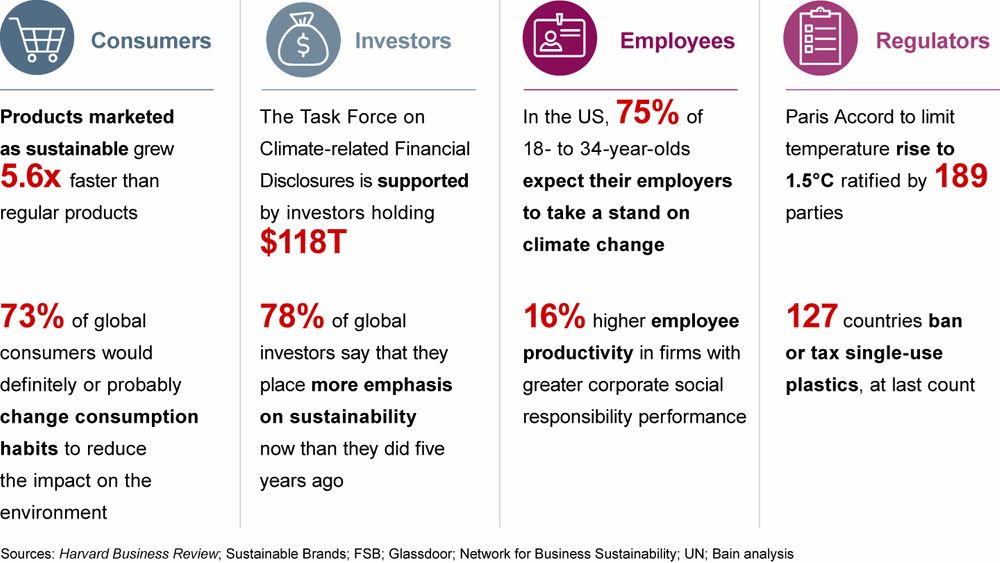Move over digital, make way for sustainabile transformation

Sustainability has moved up the business league table in dramatic fashion. With its roots in ethical business and corporate social responsibility, it has turned into a financial growth area as consumers become more aware of sustainable credentials, regulators and governments shoot for ecological targets and consumption threatens to outstrip resources.
Sometimes, it’s just good business too.

Sustainability has broadened in scope. Environmental threats now include weather systems and sea levels on top of extinction and pollution. Social, economic and governance challenges (race, gender, poverty, health) have moved into the mainstream.
If there is any doubt that sustainability is a business imperative comparable to technology, consider the actuals. Electric vehicle sales are up by a multiple of nine since 2014, Burger King is selling Whoppers with Impossible Food’s meat-replacement patty. Future regulatory measures could cost the typical consumer products company 20-25 percent of its margins.
Sustainability has outlived the global financial crisis and Bain expects it only to be accelerated by some of the hyper local shifts effected by the Covid-19 pandemic, in which companies and consumers radically overhauled their supply chains to adapt to a sudden threat to the globalised norm. Many have found benefits in doing so and won’t revert to pre-pandemic habits that have proven less efficient, more costly and/or more easily disrupted by future health or geopolitical events.
And that future also includes the International Monetary Fund’s recommended per-ton carbon price of $75 (up from $25) in 2030.
The need for change is real and recognised at executive level, but businesses have found it hard to make the transformation stick. Bain’s global research found that just 4% of sustainability initiatives succeed, against a wider change success rate of 12%. Nearly half failed entirely.

As with technology, those who have acted fastest and first stand to reap transformative rewards, with tardy entrants to the market left to scrabble in an attempt to compete in a market already dominated by newcomers. Plant-based meat could be worth $140bn by 2030. The alternative beverage market is growing at 12 percent a year. Sustainability-linked consumer product brands are growing six times faster than other brands as customer loyalty to existing brands fades.
How to find sustainable growth in sustainability
Bain recommends a four-point manifesto for enacting lasting and successful sustainability transformation.
1. Strategic choices for sustainability transformation
A Bain survey found that nine in 10 companies felt they needed to change their core business model to comply with a truly sustainable economy and nearly four in 10 felt they would need to change radically.
That means getting ahead of the pack. With vegan diets on the rise (up 600 percent in the US between 2014-17) and upwards of a tenth of the 16-24 age group in some European countries following a plant-based diet, Vion, a Dutch meat producer has pivoted to alternative meat as its next growth engine.
2. Product reinvention for sustainability transformation
Reinventing products need not be a case of making things differently. In some cases, creative thinking can do away with plastic packaging (Unilever makes toothpaste tablets in reusable containers) or reduce logistics costs (Procter & Gamble is selling dehydrated soap products that reduce transport emissions).
3. Operations reinvention for sustainability transformation
Exploration of the process can turn up unexpected efficiencies. Walmart measured delivery from physical stores against centralised delivery and found both models were more carbon efficient under different circumstances. It was able to conceive how retailers might optimise their carbon emissions and nudge consumer behaviour towards helping it achieve that goal.
4. Innovative partnerships for sustainability transformation
As with digital transformation, companies will need to find partners to help achieve sustainability targets. Because the goals are not exclusively profit focused in sustainability, there are opportunities to partner positively with competitors for mutual gain. The Consumer Goods Forum is a network of 400 consumer goods companies in 70 countries working to standardise food date labelling to reduce waste. The Alliance to End Plastic Waste, similarly, sees big brand product companies working on infrastructure and waste management projects.
To achieve these goals, Bain recommends envisioning the future as a different business environment but working towards that point today, taking care to quantify risk and disruption. By putting the transformation into sprints and regularly checking progress, missteps can be identified quickly and rectified before the point of no return. And seek new expertise by hiring, training and retraining.
For more information on business topics in the United States and Canada, please take a look at the latest edition of Business Chief North America.
Follow Business Chief on LinkedIn and Twitter.
Sources: Bain
- 6 leadership principles for transitioning into an ESG worldSustainability
- What’s separating digital ‘pioneers’ from ‘procrastinators’?Digital Strategy
- ESG metrics and measurements become priority for CFOsCorporate Finance
- Should employees be worried about AI job displacement?Technology & AI






